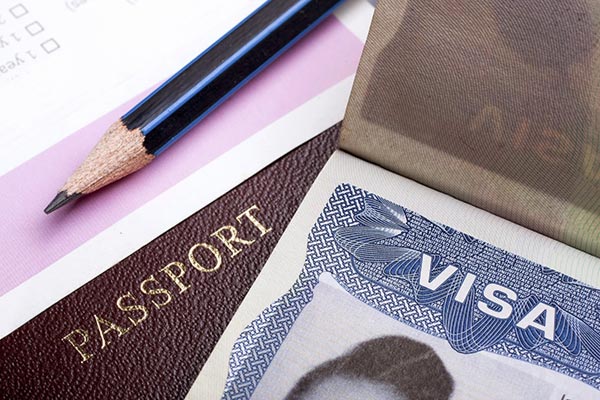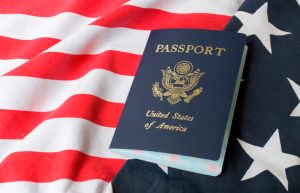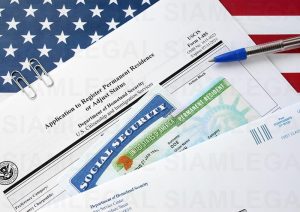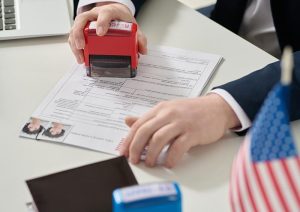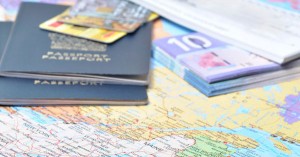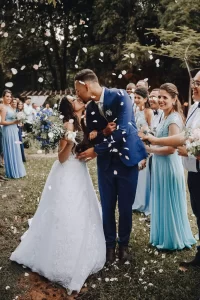US IR-1 Visa Application. The IR-1 (Immediate Relative) visa allows the spouse of a U.S. citizen to immigrate to the United States. This article provides an in-depth analysis of the IR-1 visa application process specifically for applicants residing in Thailand. It includes detailed information on eligibility, required documentation, step-by-step application procedures, and practical tips to ensure a successful application.
1. Overview of the IR-1 Visa
Purpose and Benefits:
- Permanent Residency: Grants the spouse of a U.S. citizen the right to live and work in the United States permanently.
- Path to Citizenship: IR-1 visa holders can eventually apply for U.S. citizenship.
- Family Reunification: Facilitates the reunification of families by allowing spouses to join their U.S. citizen partners.
Eligibility:
- Marriage Validity: The marriage must be legally valid and recognized by both U.S. and Thai laws.
- Marital Duration: The couple must be married for at least two years.
- US Citizenship: The sponsoring spouse must be a U.S. citizen.
2. Detailed Eligibility and Documentation
General Eligibility Criteria:
- Proof of Relationship: Demonstrating a bona fide marriage through evidence such as marriage certificates, photos, communication records, and affidavits.
- Financial Requirements: The U.S. citizen spouse must meet income requirements to sponsor the immigrant spouse, ensuring they are above the poverty line.
Required Documentation:
- Passport: Valid passport for both the U.S. citizen and the applicant.
- Marriage Certificate: Certified copy of the marriage certificate.
- Birth Certificates: Copies of birth certificates for both spouses.
- Proof of Termination of Previous Marriages: Divorce decrees or death certificates if applicable.
- Photographs: Recent passport-sized photographs of both spouses.
- Proof of U.S. Citizenship: Copy of the U.S. citizen spouse’s birth certificate, passport, or naturalization certificate.
- Financial Documents: IRS tax transcripts, pay stubs, and employment letters of the U.S. citizen spouse.
- Police Clearance Certificates: Police clearance certificates from Thailand and any other country where the applicant has lived for more than six months.
- Medical Examination: Completed medical examination form from an approved physician.
3. Step-by-Step Application Process
Initial Petition Filing:
- Form I-130 Submission: The U.S. citizen spouse must file Form I-130, Petition for Alien Relative, with U.S. Citizenship and Immigration Services (USCIS).
- Supporting Documents: Include all required supporting documents with the petition.
- Filing Fee: Pay the appropriate filing fee.
National Visa Center (NVC) Processing:
- Case Assignment: Once USCIS approves the I-130 petition, the case is forwarded to the NVC.
- Document Submission: Submit Form DS-260, Immigrant Visa Application, along with required civil and financial documents.
- Fee Payment: Pay the NVC processing fees.
- Affidavit of Support: Submit Form I-864, Affidavit of Support, to demonstrate financial capability to support the immigrant spouse.
Consular Processing:
- Interview Scheduling: The NVC schedules an interview at the U.S. Embassy in Bangkok.
- Medical Examination: Complete a medical examination with an approved physician in Thailand.
- Prepare for Interview: Gather all original documents and prepare for the consular interview.
- Consular Interview: Attend the interview with the consular officer, who will assess the application and supporting documents.
Visa Issuance and Entry to the U.S.:
- Visa Issuance: If approved, the consular officer issues the IR-1 visa.
- Travel to the U.S.: The immigrant spouse travels to the U.S. with the IR-1 visa.
- Green Card Issuance: Upon entry, the spouse receives a temporary I-551 stamp in their passport, serving as a temporary Green Card until the physical card arrives.
4. Practical Tips for a Successful Application
Document Preparation:
- Organize Documents: Arrange all documents systematically to present a clear and complete application.
- Translations: Ensure all non-English documents are translated by certified translators.
Financial Documentation:
- Comprehensive Financial Proof: Provide clear and comprehensive financial documents to meet sponsorship requirements.
- Joint Financial Assets: If applicable, show joint financial assets to demonstrate the bona fide nature of the marriage.
Interview Preparation:
- Mock Interviews: Conduct mock interviews to prepare for possible questions from the consular officer.
- Honesty and Consistency: Answer all questions honestly and consistently, providing detailed explanations if necessary.
Medical Examination:
- Approved Physicians: Schedule the medical examination with an approved physician well in advance.
- Vaccination Records: Bring complete vaccination records to the medical exam.
Dealing with Potential Issues:
- Addressing Red Flags: Be prepared to address any potential red flags, such as large age differences, language barriers, or short courtships.
- Legal Assistance: Consider seeking legal assistance if your case has complexities, such as prior visa denials or criminal records.
5. Case Studies and Real-Life Examples
Example 1: Successful Application with Joint Assets:
- Scenario: A Thai applicant married to a U.S. citizen for three years, with joint bank accounts and property.
- Action: Provided detailed financial documents, joint assets, and extensive proof of the relationship.
- Outcome: Smooth application process and approval at the consular interview.
Example 2: Addressing Potential Red Flags:
- Scenario: A couple with a significant age difference and short courtship period.
- Action: Submitted extensive communication records, affidavits from friends and family, and photos of life events together.
- Outcome: Consular officer approved the visa after a thorough interview and review of the evidence.
6. Enhancing Expertise and Credibility
Demonstrating Professional Credentials:
- Legal Partnerships: Highlight collaborations with reputable immigration attorneys and legal experts.
- Experience in Visa Processing: Showcase years of experience in assisting clients with the IR-1 visa process.
Providing Authoritative References:
- Official Sources: Reference official documentation from USCIS and the U.S. Department of State.
- Expert Insights: Include opinions and advice from recognized immigration and legal experts.
Detailed Case Studies:
- Client Testimonials: Feature testimonials from successful IR-1 visa applicants.
- Real-Life Scenarios: Provide comprehensive examples of different types of applicants and their experiences with the IR-1 visa process.
Visual Aids and Infographics:
- Application Process Flowchart: Use flowcharts to illustrate the visa application steps.
- Document Checklist: Create a checklist for required documents to help applicants organize their submissions.

